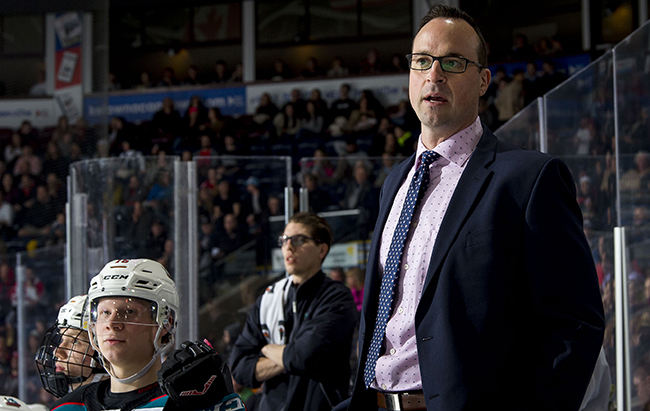Kris Mallette is ready to start his first full season behind the Kelowna Rockets bench as head coach.
It will be a quick 24-game schedule and he says it has been an interesting season and start to his career. He had a small taste last year earning three wins in six games before the season was shut down due to the COVID-19 pandemic.
“I’m looking forward to it, we’re going to be a very young team,” says Mallette, who began his junior hockey coaching career in the Kootenay International Junior Hockey League with the North Okanagan Knights. “This 24 games is basically a development module for our group, which typically isn’t the case with the Kelowna Rockets. Very seldom will we be in a rebuilding mode.”
They are in that position after going all-in when they were Memorial Cup hosts last season. The Rockets made a lot of moves for older, experienced players in pursuit of a championship.
Now Mallette will work with a young group he is excited about. The roster is loaded with 14 players who are 17 and younger. While Mallette joked he would have to remember how to tie his tie, the challenge of this shortened season will be about managing his roster. The Rockets have some veteran players, but Mallette will make sure he puts his youngsters in positions to succeed. He wants to manage expectations, while implementing systems to a degree.”
Mallette, 42, played for the Rockets from 1996-99 (played nine games in ‘99), and nine seasons of pro hockey, wants to create a positive environment where players want to be.
“It’s a fun environment. Family like,” says Mallette. “I’m a detailed guy. At the end of the day, I would love our team to play freely. I find that too much structure of X’s and O’s is hampering the youth of our time right now. I’m going to be more habit-based over structure-base. I would like our team to skate, possess the puck. When we don’t have it, I would like us to go get it and implement a fun style, much like Colorado or Vega in the NHL. They are electric in the offensive zone,but they don’t forget that their defence wins.”
Mallette has been with the Rockets since the 2014-15 season as an assistant coach when he joined the WHL club from the Vernon Vipers in the B.C. Hockey League. In that time, Mallette has seen things and has worked under four head coaches. He has picked up knowledge on what works, and seen what doesn’t. He plans to put his own stamp on the club. He’s learned the league and met people on other teams that he reaches out to for ideas.
“I think that I’m ready for this opportunity. I’ve put a lot of time in and I’m still learning,” he says. “That is not going to stop.”
Mallette’s time in the KIJHL was great and helped lead to the opportunities he’s earned. His first season with the Knights was as an assistant coach. The next two were as a successful head coach.
“I think that any time you are able to run your own team and call your own shots, the onus is on you,” he says. “I was fortunate to have good staff in Shawn Webb and Brett Tomlinson, who were able to help guide me through. Shared ideas with me. We had a good group of kids.”
At the time Mallette coached in the KIJHL, he said the league and Junior B hockey had the reputation of being a place where players went to fight. In 2012-13, Mallette led the Knights to the league final, where they lost to the Castlegar Rebels. He helped 12 players, who were still eligible to play minor hockey, get opportunities at Junior A whether it was as affiliates or full-time. That is something he is proud of.
Mallette gained knowledge from every player he had and still remains friends with them. That means the most to him. He exchanges text messages with the players and they reach out to find out how he is doing.
“Having an impact on these young men’s lives at that age, was the most rewarding thing for me,” he says. “I think I created a fun environment. A hard working environment. At the end of the day, I was an honest coach. I think they really valued that.
“The relationships with the young men at 16-17 and leaving as 20-year-olds, hopefully I can impact them to become a better person. More ready for what lies ahead,” he continued. “If that’s professional hockey, whatever occupation, if that is schooling – just preparing them to leave a better person. That’s the most rewarding thing for me.”


























